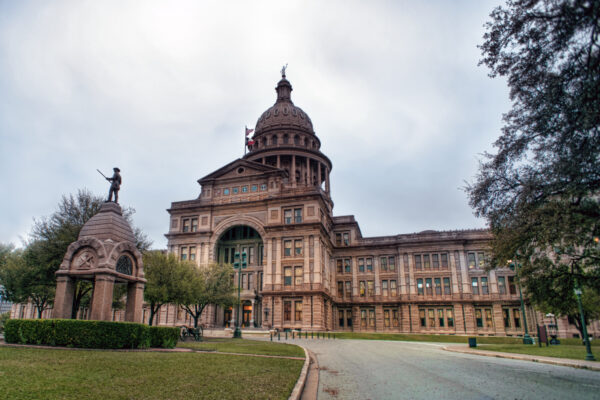Governor Abbott spent the weekend clearing his desk of all pending legislation, and thus we can finally close the book on Texas’s 84th legislative session. This year’s session wasn’t especially unusual, in that it saw its fair share of “chubbing,” glad-handing, horse-trading, and fist fights. Also typical was the sheer volume of threats leveled against Texans’ civil liberties. Thankfully, most of the worst proposals failed to make it onto the books—while some of the better ones did.
Here’s a rundown of some of the issues that mattered for civil liberties:
LGBT Rights: The Texas legislature faced a serious quandary this year. On the one hand, some of our politicians really, really despise the idea of LGBT equality—more now than ever, with the Supreme Court’s marriage equality decision due any day—and are terrified of the possibility that it will become a reality. On the other, Indiana’s “religious refusal” debacle demonstrated just how catastrophic state-sponsored discrimination is for business.
Against that backdrop, LGBT rights fared well this session. Our LGBT Equality Coalition rose to the challenge, and Texas business leaders spoke out against discriminatory laws. Legislators introduced more than 20 bills and two constitutional amendments designed to enshrine discrimination into state law, but in the end none of them passed. The only LGBT-related bill to become law (signed by Abbott with great fanfare) merely reaffirms that clergy can refuse to perform marriages that violate their religious beliefs, a right already guaranteed by the First Amendment.
Reproductive Rights: Not satisfied with passing the infamous HB 2 in 2013 (now before the Supreme Court) and the closure of more than half the states abortion clinics, extremist legislators tried to double down. They introduced measures to eliminate an exception to the state’s 20-week abortion ban for severe fetal abnormalities and to block insurance from being used to pay for the termination of a pregnancy. While both of those measures failed, others did not.
In a particularly mean-spirited attack, the legislature revamped the “judicial bypass” process, making it even more difficult for young women who are victims of neglect, abuse, or sex trafficking to access abortion services. To add insult to injury, politicians also blocked access to breast and cervical cancer screenings for patients of Planned Parenthood, and diverted more state funding to discredited “crisis pregnancy centers,” whose literature has been described by the Texas Medical Association as “needlessly graphic” and “factually inaccurate.”
Criminal Justice: Groups from every segment of the political spectrum united to reform the state’s criminal justice system. The Smart-on-Crime coalition helped enact a series of measures designed to streamline the penal code, reduce recidivism, improve the reintegration process, and give former convicts a better chance for success in life after prison. Disadvantaged school children need no longer fear a fast track to the prison system, now that truancy is no longer a crime. School police officers will receive specialized training to help them better meet the needs of the students they serve and protect. Prisoners destined for solitary will now undergo mental health screenings.
Immigration: The rights of the undocumented fared better than one might have expected in the current political climate. For one, the fact that Texas DREAMers will continue to have access to in-state university tuition was welcome news. Additionally, two attempts to wrest immigration enforcement from the federal government were thwarted: the Interstate Border Enforcement Compact, designed to allow member states to coordinate border control efforts independent of the federal government, and the Sanctuary Cities bill, which would have required local law enforcement entities to enforce immigration law at the expense of their own local priorities.
However, one immigration measure that enjoyed broad support in the legislature was passed into law. A sweeping border protection bill that costs hundreds of millions of dollars, HB 11 shows that our legislature only embraces small government and fiscal conservatism when it concerns tax rates and deregulation, but not so much when civil rights, police overreach, mission creep, and government surveillance are on the table. The law sets up a centralized surveillance center, allows for southbound checkpoints of American citizens still in the U.S., and implements a hiring surge of officers, which has proven a reliable method for fomenting corruption and abuse in law enforcement.
The bottom line: In spite of some victories for civil liberties this legislative session, lesbian, gay and transgender Texans can still be fired, evicted, or denied services in much of the state, regardless of whether the Supreme Court rules in favor of marriage equality. Texas women seeking abortion access find ever more obstacles in their path, with many more clinics forced to close if the Supreme Court refuse to step in. We still have one of the highest rates of solitary confinement in the country. Private prisons continue to clamor for more inmates, and the state still has heavy incentives to provide them. And legislators continue to push for proposals that would punish immigrants for seeking a better life.
The legislature reconvenes in 2017, and until then there is much work to do.

